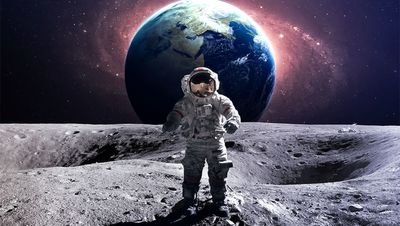"That's one small step for man; one giant leap for mankind."
This July 20th marks fifty years since Neil Armstrong, mission commander of NASA's Apollo 11, uttered those famous words. Much less discussed is how Project Apollo shifted lunar science into high gear, ultimately teaching scientists just how valuable the Moon could become.
A lunar-based solar power system would actually be cheaper than Earth-based solar power implemented on a global scale.
During the six missions that landed humans on the lunar surface from 1969 to 1972, Apollo astronauts collected some 842 pounds of lunar rocks and dirt. Analysis of these materials has provided us with major clues about the origin of Earth's celestial companion 4.51 billion years ago, but also has revealed the Moon is a treasure trove. Lunar rock contains a plethora of minerals with high industrial value. So let's take a look at some prime examples of how humanity's expected return to the lunar surface in the years to come could help life here on Earth.
24/7 solar energy for Earth
During the 1970s, scientists began examining the Apollo lunar samples to study how the lunar surface could be used as a resource. One such scientist was physicist David Criswell, who has since shown that a lunar-based solar power system would actually be cheaper than Earth-based solar power implemented on a global scale. Whoa! How is that possible, given the high cost of launching people and machines into space?
The key is that it would be enormously expensive to scale up enough Earth-based solar power to supply all of humanity's electrical needs, since solar power on such a scale would require a lot of metal, glass, and cement.
But the Moon's lack of atmosphere and weather means that photovoltaic cells built by robots from lunar materials can be paper thin, in contrast with the heavy structures needed in Earth-based solar arrays. Ringing the Moon, such a system would be in perpetual sunlight, making it cheaper to collect solar power there and beam it down to Earth in the form of microwaves.
A source of helium-3 for clean, safe nuclear fusion power and other uses
The gas helium-3 is extremely rare on Earth, but plentiful on the Moon, and could be used in advanced nuclear fusion reactors. Helium-3 also has anti-terrorism and medical uses, especially in the diagnosis of various pulmonary diseases.
A place to offload industrial pollution
Since there are minerals and oxygen in lunar rocks and dust, and frozen water in certain locations, the Moon is an ideal home for factories. Thus, billionaire Jeff Bezos has proposed relocating large segments of heavy industry there, reducing the amount of pollution that is produced on Earth.
The Moon could be a place for colonists to get their space legs before humans put down roots on more distant locations like Mars.
Radio Astronomy without interference from Earth
Constructed on the Moon's far side (the side of the Moon that always faces away from Earth), radio telescopes advancing human knowledge of the Cosmos, and searching for signals from extraterrestrial civilizations, could operate with increased sensitivity and efficiency.
Lunar Tourism
Using the Moon as a destination for tourists may not sound helpful initially, given that only the very wealthy would be able to afford such journeys in the foreseeable future. However, the economic payoff could be substantial in terms of jobs that lunar tourism could provide on Earth. Furthermore, short of actual tourism, companies are gearing up to provide lunar entertainment to fun-seekers here on Earth in the form of mini lunar rovers that people could control from their living rooms, just for fun.
Lunar Colonies
Similar to lunar tourism, lunar colonization sounds initially like a development that would help only those people who go. But, located just three-days' travel from Earth, the Moon would be an excellent place for humanity to become a multi-planet species. The Moon could be a place for colonists to get their space legs before humans put down roots on more distant locations like Mars. With hundreds or thousands of humans thriving on the Moon, Earthlings might find some level of peace of mind knowing that humanity is in a position to outlive a planetary catastrophe.
